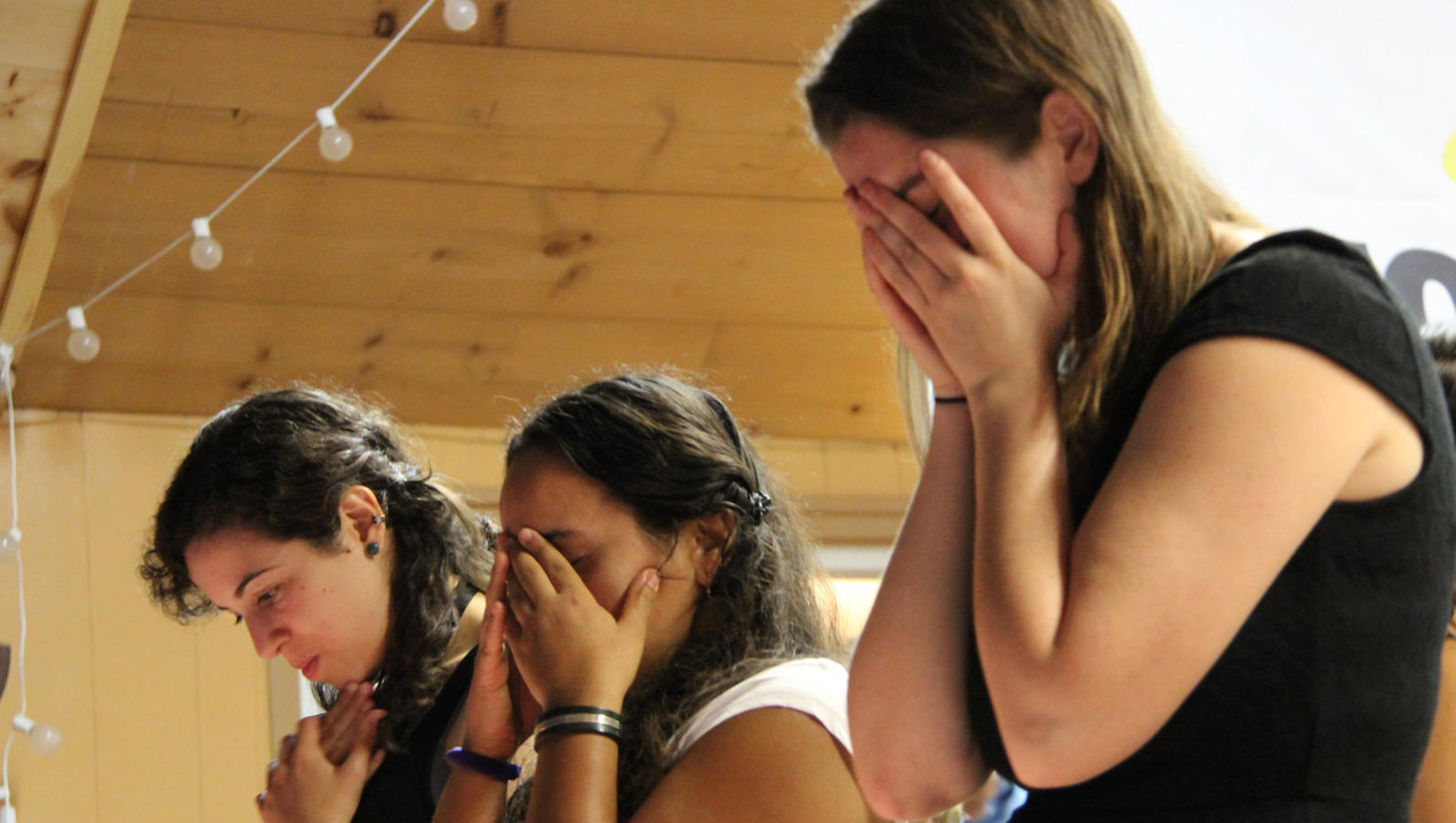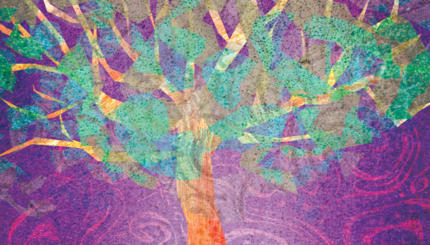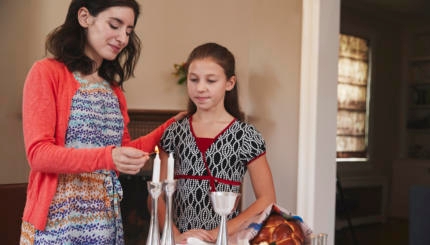Like most Jewish observances, has a unique liturgy that is recited during communal prayer. But there are also a number of blessings that are traditionally recited in the home on Friday evening.
The songs and blessings before the Friday night meal include: blessing for lighting the candles, blessing for the children, Shalom Aleichem (welcoming the Sabbath angels), Eshet Hayil (Woman of Valor), Kiddush, Netilat Yadayim (a blessing for washing hands), Hamotzi (blessing for the bread). After the meal, many recite Birkat Hamazon (Grace After Meals) and sing special Sabbath songs called Zemirot.
Read on for the text of these blessings and fuller explanation.
Blessing over the Candles
The lighting of candles as sunset approaches on Friday is the traditional sign of the arrival of Shabbat. After lighting the candles, it is customary to cover one’s eyes and recite the following:

Help us keep Jewish knowledge accessible to millions of people around the world.
Your donation to My Jewish Learning fuels endless journeys of Jewish discovery. With your help, My Jewish Learning can continue to provide nonstop opportunities for learning, connection and growth.
בָּרוּך אַתָּה ה׳ אֱלֹהֵינוּ מֶלֶך הָעוֹלָם אַשֶׁר קִדְשָׁנוּ בְּמִצְוֹתָיו וְצִוָנוּ לְהַדְלִיק נֵר שֶל שַבָּת
Baruch ata Adonai, Eloheinu Melech ha-olam, asher kidshanu b’mitzvotav vitzivanu l’hadlik ner shel Shabbat.
Blessed are You, God, Ruler of the universe, who sanctified us with the commandment of lighting Shabbat candles.
Blessing for the Children
In households with children, it is traditional to offer a special blessing on Friday night after candle-lighting. There are two versions, one for boys and one for girls.
For boys, the introductory line is:
יְשִׂימְךָ אֱלֹהיִם כְּאֶפְרַיְם וְכִמְנַשֶּׁה
Yismech Elohim k’Ephraim v’chi-Menashe.
May you be like Ephraim and Menashe.
For girls, the introductory line is:
יְשִׂימֵךְ אֱלֹהיִם כְּשָׂרָה רִבְקָה רָחֵל וְלֵאָה
Yesimech Elohim k’Sarah Rivka Rachel v’Leah
May you be like Sarah, Rebecca, Rachel, and Leah.
For both boys and girls, the rest of the blessing is:
יְבָרֶכְךָ ה׳ וְיִשְׁמְרֶךָ
יָאֵר ה׳ פָּנָיו אֵלֶיךָ וִיחֻנֶּךָּ
יִשָּׂא ה׳ פָּנָיו אֵלֶיךָ וְיָשֵׂם לְךָ שָׁלוֹם
Yivarechecha Adonai v’yishmerecha
Ya’er Adonai panav eilecha vichuneka
Yisa Adonai panav eilecha v’yasem lecha shalom
May God bless you and protect you.
May God show you favor and be gracious to you.
May God show you kindness and grant you peace.
Shalom Aleichem
Upon approaching the table, it is traditional to welcome the Sabbath angels with this song whose name in fact means “welcome.”
שָׁלוֹם עֲלֵיכֶם מַלְאֲכֵי הַשָּׁרֵת מַלְאֲכֵי עֶלְיוֹן מִמֶּלֶךְ מַלְכֵי הַמְּלָכִים הַקָּדוֹשׁ בָּרוּךְ הוּא
בּוֹאֲכֶם לְשָׁלוֹם מַלְאֲכֵי הַשָּׁלוֹם מַלְאֲכֵי עֶלְיוֹן מִמֶּלֶךְ מַלְכֵי הַמְּלָכִים הַקָּדוֹשׁ בָּרוּךְ הוּא
בָּרְכוּנִי לְשָׁלוֹם מַלְאֲכֵי הַשָּׁלוֹם מַלְאָכֵי עֶלְיוֹן מִמֶּלֶךְ מַלְכֵי הַמְּלָכִים הַקָּדוֹשׁ בָּרוּךְ הוּא
צֵאתְכֶם לְשָׁלוֹם מַלְאֲכֵי הַשָּׁלוֹם מַלְאָכֵי עֶלְיוֹן מִמֶּלֶךְ מַלְכֵי הַמְּלָכִים הַקָּדוֹשׁ בָּרוּךְ הוּא
Shalom aleichem mal’achei hashareit mal’achei elyon mimelech malchei ham’lachim, ha-kadosh baruch hu
Bo’achem l’shalom mal’achei hashalom mal’achei elyon mimelech malchei ham’lachim, ha-kadosh baruch hu
Barechuni l’shalom mal’achei hashalom mal’achei elyon mimelech malchei ham’lachim, ha-kadosh baruch hu
Tzeitchem l’shalom mal’achei hashalom mal’achei elyon mimelech malchei ham’lachim, ha-kadosh baruch hu
Peace be with you, ministering angels, messengers of the Most High, messengers of the King of Kings, the Holy One, Blessed be He.
Come in peace, messengers of peace, messengers of the Most High, messengers of the King of Kings, the Holy One, Blessed be He.
Bless me with peace, messengers of peace, messengers of the Most High, messengers of the King of Kings, the Holy One, Blessed be He.
Go in peace, messengers of peace, messengers of the Most High, messengers of the King of Kings, the Holy One, Blessed be He.
Eshet Hayil (Woman of Valor)
Introduced by the Jewish mystics in the 17th century, this melody is sung as a tribute to the woman of the house, normally right after Shalom Aleichem. This excerpt from the 31st chapter of the book of Proverbs, and it describes a “woman of valor.”
You can read the full text of Eshet Hayil here.
Listen to Eshet Chayil (courtesy of Mechon Hadar)
Blessing over Wine or Grape Juice (Kiddush)
The kiddush marks Shabbat as sacred time. Recite the blessing before sipping the wine or grape juice. The Shabbat evening Kiddush is often preceded by a paragraph called Vayechulu, taken straight from the Hebrew Bible, which recounts the moment God completed creation and decided to rest. Here is the complete Kiddush, including Vayechulu:
וַיְהִי עֶרֶב וַיְהִי בֹקֶר
יוֹם הַשִּׁשִּׁי. וַיְכֻלּוּ הַשָּׁמַיִם וְהָאָרֶץ וְכָל צְבָאָם
וַיְכַל אֱלֹהִים בַּיּום הַשְּׁבִיעִי מְלַאכְתּו אֲשֶׁר עָשָׂה. וַיִּשְׁבֹּת בַּיּום הַשְּׁבִיעִי מִכָּל מְלַאכְתּו אֲשֶׁר עָשָׂה
וַיְבָרֶךְ אֱלֹהִים אֶת יוֹם הַשְּׁבִיעִי וַיְקַדֵּשׁ אֹתוֹ. כִּי בוֹ שָׁבַת מִכָּל מְלַאכְתּוֹ אֲשֶׁר בָּרָא אֱלֹהִים לַעֲשׂוֹת
סַבְרִי מָרָנָן וְרַבָּנָן וְרַבּותַי
בָּרוּךְ אַתָּה ה׳ אֱלֹהֵינוּ מֶלֶךְ הָעוֹלָם בּוֹרֵא פְּרִי הַגָּפֶן
בָּרוּךְ אַתָּה ה’ אֱלֹהֵינוּ מֶלֶךְ הָעולָם אֲשֶׁר קִדְּשָׁנוּ בְּמִצְוֹתָיו וְרָצָה בָנוּ. וְשַׁבַּת קָדְשׁוֹ בְּאַהֲבָה וּבְרָצוֹן הִנְחִילָנוּ זִכָּרוֹן לְמַעֲשֵׂה בְרֵאשִׁית. כִּי הוּא יוֹם תְּחִלָּה לְמִקְרָאֵי קדֶשׁ זֵכֶר לִיצִיאַת מִצְרָיִם. כִּי בָנוּ בָחַרְתָּ וְאוֹתָנוּ קִדַּשְׁתָּ מִכָּל הָעַמִּים וְשַׁבַּת קָדְשְׁךָ בְּאַהֲבָה וּבְרָצוֹן הִנְחַלְתָּנוּ
בָּרוּךְ אַתָּה ה׳ מְקַדֵּשׁ הַשַּׁבָּת
(Quietly: Va-y’hee erev, va-y’hee boker.)
Yom ha-shishi. Vay’chulu hashamayim v’ha-aretz v’chol tz’va’am. Vay’chal Elohim bayom hash’vi’i milachto asher asa. Vayishbot bayom hash’vi’i mikol milachto asher asa. Vay’varech Elohim et yom hash’vi’i vay’kadesh oto. Kee vo shabbat mi-kol m’lachto asher bara Elohim la’asot.
Savri maranan v’rabanan v’rabotai. Baruch ata Adonai, Eloheinu melech ha-olam, borei p’ri hagafen.
Baruch ata Adonai, Eloheinu melech ha-olam, asher kid’shanu b’mitzvotav v’ratza vanu, v’shabbat kod’sho b’ahava uv’ratzon hinchilanu, zikaron l’ma’aseh b’reishit. Ki hu yom t’chila l’mikra-ay kodesh, zaycher l’tziat mitzrayim. Ki vanu vacharta v’otanu kidashta mikol ha’amim. V’shabbat kod-shi-cha b’ahava uv’ratzon hinchal tanu. Baruch ata Adonai, mi’kadesh ha Shabbat.
(Quietly: There was an evening, there was a morning.)
The sixth day: And the Heavens and the Earth and all they contained were completed, and on the seventh day God desisted from all the work that he had done. And God rested on the seventh day from all the work that he had done. And God blessed the seventh day and sanctified it, for on that day he rested from all the work which he had done in creating the world.
[Leader:] By your leave, rabbis, masters, teachers!
[Diners:] To Life!
Blessed are you, Lord our God, Ruler of the Universe, who creates the fruit of the vine.
Blessed are you, Lord our God, Ruler of the Universe, how has sanctified us with his commandments and favored us, and given us in love and favor his holy Shabbat as an inheritance, as a remembrance of the act of creation. For this day is the beginning of all holy days, a remembrance of the Exodus from Egypt. For you have chosen us and you have blessed us from among all the nations. And you have bequeathed us your holy Shabbat in love and favor. Blessed are you, Lord, who sanctifies Shabbat.
Listen to the Kiddush for Shabbat Evening (courtesy of Mechon Hadar)
Blessing over Hand Washing (Netilat Yadayim)
Following Kiddush, it is customary to wash one’s hands prior to continuing the meal. After washing the hands with water from a cup — often twice on the right hand and twice on the left, though precise practices vary — the following blessing is recited:
בָּרוּךְ אַתָּה ה׳ אֱלֹהֵינוּ מֶלֶךְ הָעוֹלָם אֲשֶׁר קִדְּשָׁנוּ בְּמִצְוֹתָיו וְצִוָּנוּ עַל נְטִילַת יָדַיִם
Baruch ata Adonai, Eloheinu Melech ha-olam, asher kidshanu b’mitzvotav vitzivanu al n’tilat yadayim.
Blessed are You, Lord our God, King of the universe, who has sanctified us with Your commandments, and command us concerning the washing of the hands.
Blessing over the Bread (Hamotzi)
After the washing of hands, some people have the custom of remaining silent until bread is eaten. Prior to eating the bread, the following blessing is recited.
בָּרוּך אַתָּה ה׳ אֱלֹהֵינוּ מֶלֶך הָעוֹלָם הָמוֹצִיא לֶחֶם מִן הַאָרֶץ
Baruch ata Adonai, Eloheinu Melech ha-olam, hamotzi lechem min ha’aretz.
Blessed are You, Lord our God, King of the universe, who has brought forth bread from the earth.
Blessing after the Meal (Birkat Hamazon, or Benching)
After the meal, some families have the tradition of reciting Birkat Hamazon (sometimes called benching). This lengthy blessing, whose recitation is required after any meal that includes bread, includes multiple expressions of gratitude to God for providing food and sustenance to the Jewish people. On Shabbat, it is preceded by an additional Psalm and, if three adults (in some traditions, three adult males) have eaten together, by a short invitation to prayer known as a zimmun.
The full text can be found in most bentchers, small booklets containing the blessing after the meal and other festive songs. You can purchase a bentcher here or at your local Judaica store. They also are frequently distributed at weddings and bar/bat mitzvah celebrations.
Read the full text of Birkat Hamazon in Hebrew and English here.
Listen to the Birkat Hamazon (courtesy of Mechon Hadar)
Zemirot
Singing festive hymns is a common practice at the Shabbat table. There are a number of traditional ones, many of them composed by the ancient Jewish mystics. You can listen to some traditional ones here.
A searchable database of Shabbat song recordings and lyrics can be found here.
Sign up for My Jewish Learning’s RECHARGE, a weekly email with a collection of Shabbat readings and more to enhance your day of rest experience.



